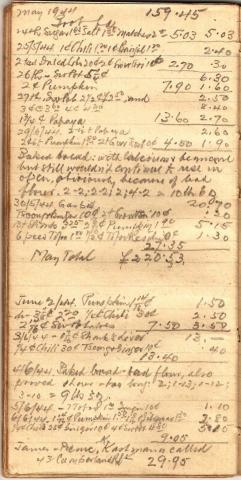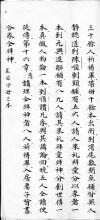70 years ago: Hong Kong's wartime diaries
24 May - 6 Jun 1944, Tom Hutchinson's Wartime Diary
Submitted by barbaramerchant on Sun, 2013-09-15 16:49Book / Document:Date(s) of events described:Wed, 24 May 1944 to Tue, 6 Jun 1944Notes:
30/5/44 - Gas bill 20.70
6/6/44 - James - Picnic. K. Kastmann called. 43 Cumberland Rd.Supporting information:
24 May 1944, R. E. Jones Wartime diary
Submitted by Admin on Mon, 2014-05-12 14:31Book / Document:Date(s) of events described:Wed, 24 May 194424 May 1944, Chronology of Events Related to Stanley Civilian Internment Camp
Submitted by brian edgar on Mon, 2016-09-26 18:33Book / Document:Date(s) of events described:Wed, 24 May 1944Almost three weeks after it became known in Stanley, the (London) Daily Mail publishes an article based on an interview with Sir Arthur Blackburn. It is an upbeat but largely accurate account of life in the camp that must have gone some way to ease the minds of relatives distressed by the 1942 reports of atrocities in Hong Kong:
Stanley Camp has been a triumph for the internees. The 3,000 people - 2,600 British, the rest American and Dutch - have made it into a well-governed town....
The Camp has its own courts. The Chief Justice of the Supreme Court, Sir Atholl Macgregor...(has) heard civil cases and has even made a decree nisi in divorce proceedings. For the police courts, magistrates have passed sentences for theft.
Clergymen in the camp hold services and solemnise weddings. There is a school for the children, and there is a hospital. Several babies have been born in the camp.
Cooking teams provide hot meals twice daily. Labour parties do woodcutting, building, scavenging, and road repairs.
Others distribute food, mend shoes and cut hair.
Three communal councils are in charge, with block supervisors to keep order. Much of the heavy work is done by British members of the Hongkong police force.
This is all pretty much true, but of course it disguises the daily reality of hunger, the difficult and squalid living conditions, and the occasional uprush of terror at the possibility of individual arrest and torture or of a general massacre.
The article goes on to describe conditions in the first three months - when Blackburn was in Stanley - and, although it is quite correct to say that almost everything improved thereafter, its statement that 'Overcrowding and food were the big problems at first' might well have given the impression that rations in 1944 were adequate and the internees had plenty of space! It seems that whoever wrote the letter informing a correspondent in camp about the interview knew its contents well: the rosy picture Blackburn painted was (wrongly) believed by some internees to have been an attempt by Franklin Gimson to signal to the British Government that there was no need to get the internees repatriated from Kong Kong.
Source:
Daily Mail, May 24, 1943, p. 3, 'Judge Has Court in Prison Camp'


